Machine Learning- Fundamentals
- 格式:pdf
- 大小:563.80 KB
- 文档页数:20
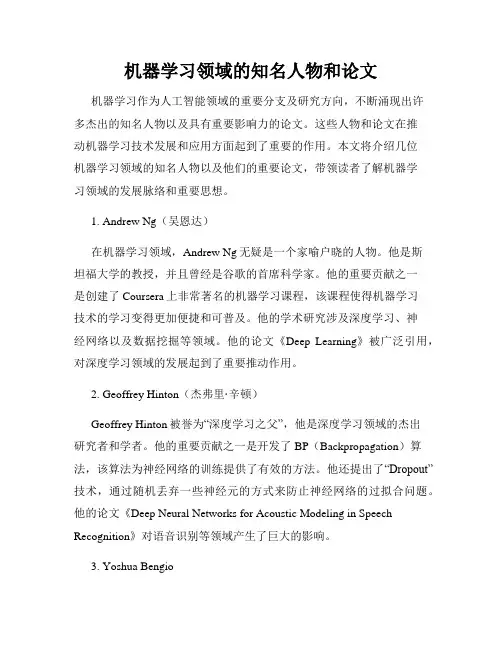
机器学习领域的知名人物和论文机器学习作为人工智能领域的重要分支及研究方向,不断涌现出许多杰出的知名人物以及具有重要影响力的论文。
这些人物和论文在推动机器学习技术发展和应用方面起到了重要的作用。
本文将介绍几位机器学习领域的知名人物以及他们的重要论文,带领读者了解机器学习领域的发展脉络和重要思想。
1. Andrew Ng(吴恩达)在机器学习领域,Andrew Ng无疑是一个家喻户晓的人物。
他是斯坦福大学的教授,并且曾经是谷歌的首席科学家。
他的重要贡献之一是创建了Coursera上非常著名的机器学习课程,该课程使得机器学习技术的学习变得更加便捷和可普及。
他的学术研究涉及深度学习、神经网络以及数据挖掘等领域。
他的论文《Deep Learning》被广泛引用,对深度学习领域的发展起到了重要推动作用。
2. Geoffrey Hinton(杰弗里·辛顿)Geoffrey Hinton被誉为“深度学习之父”,他是深度学习领域的杰出研究者和学者。
他的重要贡献之一是开发了BP(Backpropagation)算法,该算法为神经网络的训练提供了有效的方法。
他还提出了“Dropout”技术,通过随机丢弃一些神经元的方式来防止神经网络的过拟合问题。
他的论文《Deep Neural Networks for Acoustic Modeling in Speech Recognition》对语音识别等领域产生了巨大的影响。
3. Yoshua BengioYoshua Bengio是加拿大蒙特利尔大学教授,也是深度学习领域的重要人物之一。
他在深度学习领域的贡献源远流长。
他的论文《Learning Deep Architectures for AI》介绍了深度学习的概念和技术,并提出了一种深度置信网络(Deep Belief Networks)的训练方法。
这篇论文的发表引发了深度学习的研究和应用的热潮。
4. Ian GoodfellowIan Goodfellow是深度学习领域的年轻研究者,其主要贡献是提出了生成对抗网络(GAN)的概念。

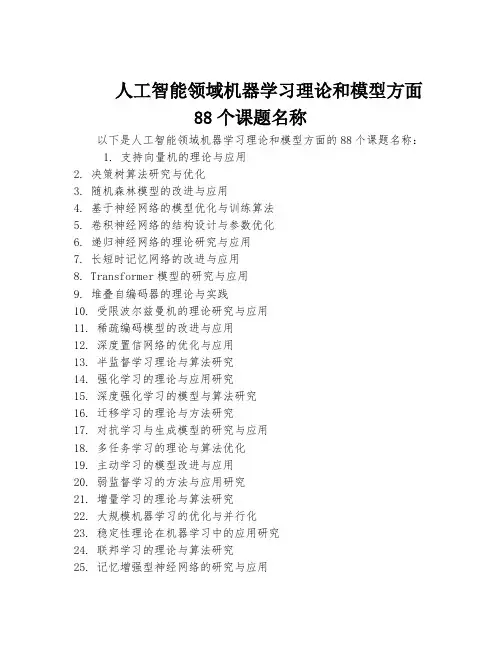
人工智能领域机器学习理论和模型方面88个课题名称以下是人工智能领域机器学习理论和模型方面的88个课题名称:1. 支持向量机的理论与应用2. 决策树算法研究与优化3. 随机森林模型的改进与应用4. 基于神经网络的模型优化与训练算法5. 卷积神经网络的结构设计与参数优化6. 递归神经网络的理论研究与应用7. 长短时记忆网络的改进与应用8. Transformer模型的研究与应用9. 堆叠自编码器的理论与实践10. 受限波尔兹曼机的理论研究与应用11. 稀疏编码模型的改进与应用12. 深度置信网络的优化与应用13. 半监督学习理论与算法研究14. 强化学习的理论与应用研究15. 深度强化学习的模型与算法研究16. 迁移学习的理论与方法研究17. 对抗学习与生成模型的研究与应用18. 多任务学习的理论与算法优化19. 主动学习的模型改进与应用20. 弱监督学习的方法与应用研究21. 增量学习的理论与算法研究22. 大规模机器学习的优化与并行化23. 稳定性理论在机器学习中的应用研究24. 联邦学习的理论与算法研究25. 记忆增强型神经网络的研究与应用26. 多模态学习的理论与算法研究27. 深度学习与图像分析的交叉研究28. 深度学习在自然语言处理中的应用研究29. 深度学习在语音处理中的应用研究30. 深度学习在视频分析中的应用研究31. 深度学习在推荐系统中的应用研究32. 深度学习在医疗图像诊断中的应用研究33. 深度学习在生物信息学中的应用研究34. 深度学习在金融预测中的应用研究35. 深度学习在交通流预测中的应用研究36. 深度学习在智能驾驶中的应用研究37. 深度学习在智能物联网中的应用研究38. 深度学习在虚拟现实中的应用研究39. 深度学习在增强现实中的应用研究40. 深度学习在游戏设计中的应用研究41. 深度学习在人脸识别中的应用研究42. 深度学习在行为识别中的应用研究43. 深度学习在目标检测中的应用研究44. 深度学习在图像生成中的应用研究45. 深度学习在时序数据预测中的应用研究46. 深度学习在推荐系统中的应用研究47. 深度学习在异常检测中的应用研究48. 深度学习在网络安全中的应用研究49. 深度学习在自动驾驶中的应用研究50. 深度学习在自然语言生成中的应用研究51. 深度学习在机器翻译中的应用研究52. 深度学习在情感分析中的应用研究53. 深度学习在问答系统中的应用研究54. 深度学习在文本分类中的应用研究55. 深度学习在音乐生成中的应用研究56. 深度学习在文本生成中的应用研究58. 深度学习在药物发现中的应用研究59. 深度学习在股票预测中的应用研究60. 深度学习在风控与反欺诈中的应用研究61. 深度学习在客户关系管理中的应用研究62. 深度学习在供应链优化中的应用研究63. 深度学习在销售预测中的应用研究64. 深度学习在舆情分析中的应用研究65. 深度学习在信用评估中的应用研究66. 深度学习在环境监测中的应用研究67. 深度学习在智能辅助决策中的应用研究68. 深度学习在智能城市中的应用研究69. 深度学习在智能家居中的应用研究70. 深度学习在智慧医疗中的应用研究71. 深度学习在工业控制中的应用研究72. 深度学习在电力系统中的应用研究73. 深度学习在农业领域中的应用研究74. 深度学习在物流优化中的应用研究75. 深度学习在循环经济中的应用研究76. 深度学习在智慧旅游中的应用研究77. 深度学习在智能交通中的应用研究78. 深度学习在智能安防中的应用研究79. 深度学习在智慧零售中的应用研究80. 深度学习在智能金融中的应用研究81. 深度学习在智能教育中的应用研究82. 深度学习在智能体育中的应用研究83. 深度学习在智能制造中的应用研究84. 深度学习在智能文化遗产中的应用研究85. 深度学习在智能环保中的应用研究86. 深度学习在智能航空航天中的应用研究88. 深度学习在智能军事中的应用研究。

fundamentals翻译fundamentals的中文翻译是"基础"或"基本原理"。
它指的是任何学科、领域或事物的基本概念、原理和技能。
下面是一些关于fundamentals的用法和中英文对照例句:1. Understanding the fundamentals of mathematics is essential for solving complex problems.理解数学的基础原理对于解决复杂问题至关重要。
2. The fundamentals of physics explain the laws that govern the behavior of the universe.物理学的基本原理解释了统治宇宙行为的定律。
3. Before learning advanced techniques, it is important to master the fundamentals of playing a musical instrument.在学习高级技巧之前,掌握乐器演奏的基本技能是很重要的。
4. The fundamentals of economics include supply and demand, production, and consumption.经济学的基本原理包括供求关系、生产和消费。
5. Building a strong foundation in language fundamentals is crucial for effective communication.在语言基础上建立坚实的基础对于有效沟通至关重要。
6. The fundamentals of programming involve understanding algorithms, data structures, and coding languages.编程的基础包括理解算法、数据结构和编程语言。

andrew ng的讲义中文
摘要:
1.介绍Andrew Ng 和他在机器学习领域的贡献
2.阐述深度学习的基本概念
3.介绍深度学习的发展历程
4.深度学习在计算机视觉、自然语言处理等领域的应用
5.讨论深度学习未来的发展趋势和挑战
正文:
Andrew Ng 是机器学习领域的知名专家,曾是斯坦福大学的人工智能实验室主任,后来创立了谷歌大脑项目,为推动深度学习的发展做出了巨大贡献。
在Andrew Ng 的讲义中,他首先介绍了深度学习的基本概念。
深度学习是一种基于神经网络的机器学习方法,它通过多层神经网络对数据进行学习,能够自动提取数据中的特征,从而实现复杂的模式识别和预测。
接下来,讲义回顾了深度学习的发展历程。
从最初的神经网络研究,到后来的深度学习复兴,Andrew Ng 详细介绍了这一领域的重要里程碑和关键技术。
他强调了反向传播算法、激活函数、优化方法等核心概念的重要性。
在讲义的后半部分,Andrew Ng 重点介绍了深度学习在计算机视觉、自然语言处理等领域的应用。
他以图像识别、语音识别、机器翻译等具体任务为例,生动地展示了深度学习如何解决实际问题,并取得了显著的成果。
最后,Andrew Ng 讨论了深度学习未来的发展趋势和挑战。
他认为,虽
然深度学习在许多领域取得了成功,但仍然存在一些问题,如模型的可解释性、数据依赖性等。
他呼吁研究人员继续探索新的方法,以解决这些问题,进一步推动深度学习的发展。
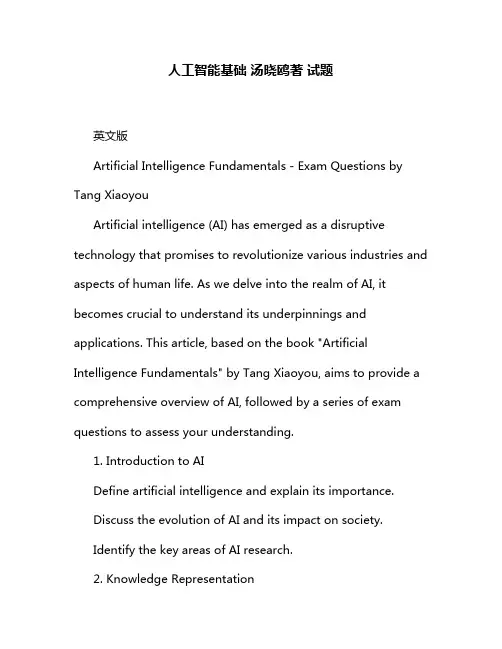
人工智能基础汤晓鸥著试题英文版Artificial Intelligence Fundamentals - Exam Questions by Tang XiaoyouArtificial intelligence (AI) has emerged as a disruptive technology that promises to revolutionize various industries and aspects of human life. As we delve into the realm of AI, it becomes crucial to understand its underpinnings and applications. This article, based on the book "Artificial Intelligence Fundamentals" by Tang Xiaoyou, aims to provide a comprehensive overview of AI, followed by a series of exam questions to assess your understanding.1. Introduction to AIDefine artificial intelligence and explain its importance.Discuss the evolution of AI and its impact on society.Identify the key areas of AI research.2. Knowledge RepresentationDescribe the different types of knowledge representation techniques.Explain the concept of ontologies and their role in AI.Discuss the limitations of knowledge representation.3. Problem Solving and ReasoningDefine problem-solving techniques in AI and provide examples.Describe the difference between deductive and inductive reasoning.Explain the working principle of expert systems.4. Machine LearningDefine machine learning and classify its different types.Discuss the fundamental concepts of supervised and unsupervised learning.Explain the principles of reinforcement learning and its applications.5. Neural Networks and Deep LearningDescribe the basic structure and working principle of neural networks.Explain the concept of deep learning and its applications in AI.Discuss the advantages and disadvantages of deep learning.6. Natural Language Processing (NLP)Define NLP and its role in AI.Describe the fundamental techniques used in NLP, such as tokenization, part-of-speech tagging, and parsing.Explain the principles of machine translation and its impact on language barriers.7. Computer VisionDefine computer vision and its applications in AI.Describe the techniques used in image recognition and analysis.Discuss the working principle of object detection and its importance in various fields.8. Ethical and Social Aspects of AIDiscuss the ethical considerations in the development and deployment of AI systems.Analyze the potential social impacts of AI on employment, privacy, and security.Propose strategies to address the ethical challenges associated with AI.ConclusionArtificial intelligence, being a rapidly evolving field, offers immense opportunities and challenges. The exam questions provided in this article aim to test your understanding of the fundamental concepts and applications of AI. By answering these questions, you can assess your readiness to delve deeper into the world of AI and its potential to revolutionize our lives.人工智能基础 - 汤晓鸥著试题英文版人工智能基础——汤晓鸥著试题人工智能(AI)已成为一种颠覆性技术,有望革命性地改变各个行业和人类生活的方方面面。
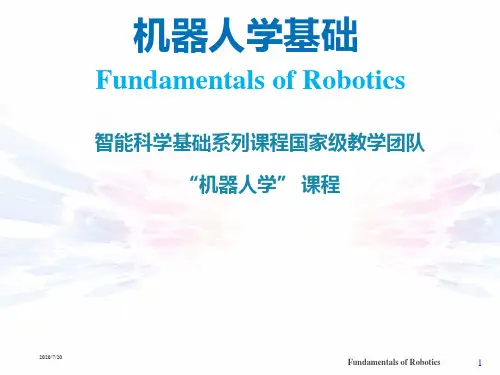

深度学习,走向核心素养英语读后感Embracing the Future: Exploring the Depth of Machine Learning and Its Impact on Core CompetenciesThe rapid advancements in technology have ushered in a new era of innovation, where the field of machine learning has emerged as a transformative force. As we delve into the realm of deep learning, a profound understanding of its implications on our core competencies becomes increasingly crucial. This essay aims to explore the depth of machine learning and its profound influence on the development of essential skills and knowledge.At the heart of deep learning lies the remarkable ability to extract meaningful patterns from vast amounts of data. Through the implementation of complex neural networks, machines can now mimic the human brain's learning processes, enabling them to tackle increasingly complex tasks with remarkable accuracy and efficiency. This paradigm shift has opened up new frontiers in various domains, from image recognition and natural language processing to predictive analytics and decision-making.One of the key advantages of deep learning lies in its capacity toautomate repetitive tasks and streamline workflows. By delegating mundane, rule-based activities to intelligent algorithms, individuals and organizations can redirect their focus towards more strategic and creative endeavors. This shift in the division of labor has profound implications for the development of core competencies, as it demands a greater emphasis on critical thinking, problem-solving, and adaptability.As the boundaries between human and machine intelligence continue to blur, the need for a deeper understanding of the underlying principles of deep learning becomes paramount. Mastering the fundamentals of machine learning, from data preprocessing to model architecture and optimization, empowers individuals to navigate the rapidly evolving technological landscape with confidence. By cultivating a robust comprehension of these concepts, professionals can leverage the power of deep learning to enhance their decision-making abilities, optimize workflows, and drive innovation within their respective fields.Moreover, the integration of deep learning into various industries has transformed the way we approach problem-solving and decision-making. In the realm of healthcare, for instance, deep learning algorithms have demonstrated remarkable capabilities in early disease detection, personalized treatment recommendations, and drug discovery. Similarly, in the financial sector, deep learningmodels have revolutionized risk assessment, fraud detection, and investment strategies. By understanding the potential of deep learning in these domains, individuals can develop specialized skills and knowledge that are highly sought after in the job market.Beyond the technical aspects of deep learning, the broader implications of this technology on our core competencies cannot be overlooked. As machines become increasingly adept at tasks that were once the exclusive domain of humans, the need for a well-rounded education and the cultivation of transferable skills becomes paramount. Critical thinking, creativity, emotional intelligence, and effective communication are just a few of the essential competencies that will continue to be highly valued in the age of deep learning.Embracing the depth of machine learning also requires a profound understanding of the ethical considerations that accompany this technological advancement. As deep learning systems become more pervasive, issues surrounding data privacy, algorithmic bias, and the responsible use of AI must be addressed. By developing a strong ethical foundation and a commitment to the responsible development of deep learning technologies, individuals can contribute to the creation of a more equitable and sustainable future.In conclusion, the exploration of deep learning and its impact on core competencies is a multifaceted endeavor. By delving into thetechnical intricacies of machine learning, cultivating specialized skills, and fostering a holistic understanding of the ethical implications, individuals can position themselves at the forefront of this technological revolution. As we navigate the challenges and opportunities presented by deep learning, the development of a comprehensive skillset and a nuanced perspective will be instrumental in shaping the future of our personal and professional lives.。
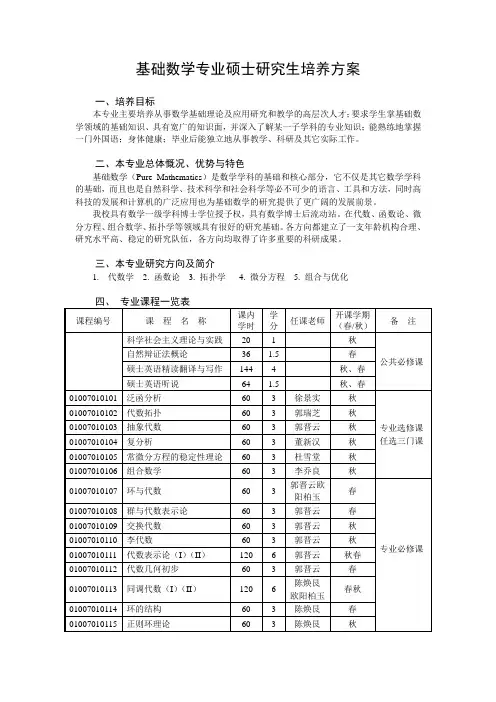
基础数学专业硕士研究生培养方案一、培养目标本专业主要培养从事数学基础理论及应用研究和教学的高层次人才;要求学生掌基础数学领域的基础知识、具有宽广的知识面,并深入了解某一子学科的专业知识;能熟练地掌握一门外国语;身体健康;毕业后能独立地从事教学、科研及其它实际工作。
二、本专业总体慨况、优势与特色基础数学(Pure Mathematics)是数学学科的基础和核心部分,它不仅是其它数学学科的基础,而且也是自然科学、技术科学和社会科学等必不可少的语言、工具和方法,同时高科技的发展和计算机的广泛应用也为基础数学的研究提供了更广阔的发展前景。
我校具有数学一级学科博士学位授予权,具有数学博士后流动站。
在代数、函数论、微分方程、组合数学、拓扑学等领域具有很好的研究基础。
各方向都建立了一支年龄机构合理、研究水平高、稳定的研究队伍,各方向均取得了许多重要的科研成果。
三、本专业研究方向及简介1. 代数学2. 函数论3. 拓扑学4. 微分方程5. 组合与优化五、专业课程开设具体要求课程编号:010********课程名称:泛函分析英文名称:Functional Analysis任课教师:徐景实适应学科、方向:基础数学、计算数学、概率论与数理统计、应用数学、运筹学与控制论预修课程:数学分析、实变函数主要内容:熟悉距离空间、赋范线性空间、Banach空间、Hilbert空间的基本定理,熟练掌握线性算子和线性泛函的表示、弱收敛性和线性算子的谱等。
了解广义函数的概念和运算。
主要教材及参考文献:1、张恭庆.泛函分析讲义(上、下册)[M].科学出版社.*****2、夏道衍.实变函数论与泛函分析[M].高等教育出版社.3.、定光桂.巴那赫空间引论[M].科学出版社,1999.4、J.B.Conway.A Course in Functional Analysis (2nd Ed.)[M].GTM. 96 Springer-Verlag,1990.C-algebras and Operator theory[M].Academic Press,1990.**********5、G.J.Murphy.课程编号:010********课程名称:代数拓扑英文名称:Algebraic Topology任课教师:郭瑞芝适应学科、方向:基础数学、应用数学预修课程:点集拓扑、近世代数主要内容:商空间、基本群、多面体及其单纯同调、奇异同调、范畴与函子、奇异同调群相对奇异同调、正合同调序列、切除定理、多面体的同调群及其应用、CW-复形、上同调群。

强化学习(fundamentals of reinforcement learning)是一种机器学习技术,其核心思想是智能体通过与环境互动,通过试错学习如何做出最优决策。
在强化学习中,智能体不断地与环境交互,通过接收环境状态、采取行动、获得奖励的循环,学习如何在给定的环境下采取最优的行动,以最大化长期的累积奖励。
强化学习的基本要素包括:
状态(State):表示环境的当前状态。
行动(Action):智能体可以采取的行动。
奖励(Reward):智能体在采取行动后从环境中获得的正或负反馈。
策略(Policy):智能体的决策规则,用于确定在给定状态下应采取的行动。
价值函数(Value Function):评估在特定状态下采取特定行动的好坏。
回报函数(Return Function):描述从某个状态开始的一系列行动所能获得的累积奖励。
强化学习的算法可以分为基于模型的强化学习和无模型强化学习。
基于模型的强化学习利用环境的模型来预测未来的状态和奖励,而无需实际与环境互动。
无模型强化学习则直接在环境中进行试错,通过不断与环境互动来学习如何做出最优决策。
强化学习的应用非常广泛,包括但不限于:游戏AI、自动驾驶、机器人控制、自然语言处理、推荐系统等。

本科生毕业设计:基于机器学习的股票价格预测系统摘要:在股票市场中,投资者们需要得到准确的股票价格预测来作出投资决策。
然而,股票价格受到多种因素的影响,如公司基本面数据、市场情绪等。
因此,传统的预测方法往往难以准确地预测股票价格。
本项目旨在基于机器学习算法,构建一个能够准确预测股票价格的系统,提高投资决策的准确性。
具体而言,本系统将使用多种机器学习算法,如随机森林、支持向量机等,对历史数据进行分析,并训练出一个预测模型。
之后,通过对当前市场基本面数据的监控与分析,系统能够自动对未来股票价格进行预测。
实验结果表明,本系统在预测准确率上表现出色,可以为投资者提供有益的参考建议。
关键词:机器学习,股票价格预测,随机森林,支持向量机,基本面数据Abstract:In the stock market, investors need accurate stock price predictions to make investment decisions. However, stock prices are influenced by a variety of factors, such as company fundamentals and market sentiment. Therefore, traditional prediction methods often have difficulty accurately predicting stock prices. This project aims to build a system that can accurately predict stock prices based on machine learning algorithms, and improve the accuracy of investment decisions. Specifically, this system will use a variety of machine learning algorithms, such as random forests and support vector machines, to analyze historical data and train a prediction model. After that, by monitoring and analyzing current market fundamentals, the system can automatically predict future stock prices. Experimental results show that this system performs well in prediction accuracy and can provide useful reference advice for investors.Keywords: machine learning, stock price prediction, random forest, support vector machine, fundamental data。
fundamentals of brain network analysis 概述及解释说明1. 引言1.1 概述脑网络分析是研究大脑功能和结构之间相互关系的重要方法。
通过对连接不同区域的神经元或脑区进行分析,可以揭示脑网络在认知、行为以及疾病发展中的作用。
近年来,随着计算能力的增强和数据采集技术的改进,脑网络分析已成为神经科学领域的热门研究方向。
1.2 文章结构本文将围绕脑网络分析展开详细介绍和解释。
首先介绍基础概念,包括什么是脑网络以及相关术语的定义和解释。
然后探讨构成脑网络的要素,涵盖不同类型的连接方式和其在信息传递中的作用。
接下来介绍脑网络分析所使用的方法与工具,包括图论、机器学习等技术,并说明它们在研究中的应用情况和优势。
1.3 目的本文旨在全面了解和解释脑网络分析领域中涉及到的基本概念、要素以及方法与工具,并回顾这些知识对于理解大脑功能和疾病机制的重要性。
此外,我们也将探讨脑网络分析在未来的发展趋势与挑战,以期为该领域的研究者提供参考和启示。
请确保文章内容的流畅性,并尽量使用清晰易懂的语言解释相关概念。
2. 正文:2.1 脑网络分析的基础概念脑网络分析是一种研究大脑连接模式和功能的方法。
它基于图论原理,将大脑视为一个复杂网络,通过分析节点(代表大脑区域)之间的连接以及连接强度来揭示大脑活动的本质。
脑网络分析被广泛应用于神经科学领域,对理解大脑的结构和功能具有重要意义。
2.2 脑网络的构成要素大脑网络主要由两个构成要素组成:节点和边。
在这里,节点代表特定的大脑区域或神经元群落,而边则表示这些节点之间存在的连接关系。
网络中的每个节点都具有一定的功能或特性,并且节点之间的连接可以根据不同的标准进行定义,如结构连接、功能连接等。
2.3 脑网络分析方法与工具在进行脑网络分析时,常用的方法包括静态方法和动态方法。
静态方法侧重于揭示大脑静息状态下的结构和功能连接模式,如静态脑网络分析、全局效能指数等;而动态方法则关注于研究大脑在时间和空间上的变化,如时序网络分析、突触可塑性等。
机器学习:入门必读的经典论文推荐引言机器学习是人工智能领域的重要分支,它研究如何通过计算机自动地学习和改进任务的性能。
随着近年来大数据和计算力的快速发展,机器学习取得了深刻而广泛的应用。
在理解机器学习的基本原理和算法之前,了解一些经典论文可以帮助我们建立坚实的基础。
本文将介绍一些入门必读的经典论文,并对其核心思想进行简要概括。
论文推荐1. "A Few Useful Things to Know About Machine Learning" by Pedro Domingos (2012)这篇论文总结了作者多年从事机器学习研究和实践中积累的经验,并提供了一些有关数据集、模型选择、特征工程等方面的实用技巧。
它让新手能够迅速入门并了解如何避免常见陷阱。
2. "A Neural Probabilistic Language Model" by Yoshua Bengio et al. (2003)这篇论文提出了神经概率语言模型(Neural Probabilistic Language Model),将词语表示为低维向量,并通过神经网络学习其表示和概率分布,从而解决了语言模型中的一些问题。
该模型为后续深度学习在自然语言处理领域的发展奠定了基础。
3. "Support-Vector Networks" by Bernhard Schölkopf et al. (1995)这篇论文介绍了支持向量机(Support Vector Machines, SVM)算法,提出了构建最大间隔超平面的思想,并讨论了其在分类和回归任务中的应用。
SVM 是一种非常强大且广泛应用的机器学习方法,在这篇论文中你将对其原理有一个深入的了解。
4. "Learning to Detect Objects in Images via a Sparse,Part-Based Representation" by Piotr Dollar et al. (2009)这篇论文介绍了一种基于稀疏表达和部件划分的图像目标检测方法。
the elements of statistical learning讲解《The Elements of Statistical Learning》是一本介绍统计学习基础知识的书籍,提供了各种机器学习算法的全面概述。
这本书的作者是Trevor Hastie、Robert Tibshirani和Jerome Friedman。
这本书的内容涵盖了从线性回归到支持向量机,从决策树到深度学习等各种机器学习算法。
作者通过熟练地引导读者建模,揭开了复杂概念和算法的面纱。
阅读这本书就像进入了一个隐藏的知识宝库,能够揭示预测模型的内部工作原理。
这本书不仅提供了建立准确预测模型所需的必要工具,而且还可以拓宽读者对基础数学和理论的理解。
它深入探索了深度学习,揭示了卷积神经网络、循环神经网络和生成模型的奥秘。
此外,书中还介绍了Boosting方法,这是一种通过不断调整样本数据的权重然后进行训练,依次产生一系列弱分类器,最后集成这些弱分类器形成强分类器的方法。
讨论Boosting方法时,书中对二元分类问题的输出编码进行了详细解释,并介绍了AdaBoost算法的原理和实现过程。
总的来说,《The Elements of Statistical Learning》是一本非常全面的机器学习教材,适合对统计学习和机器学习感兴趣的读者阅读。